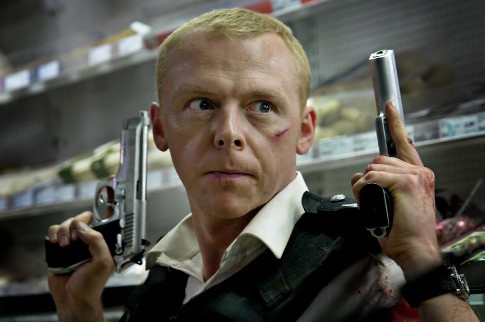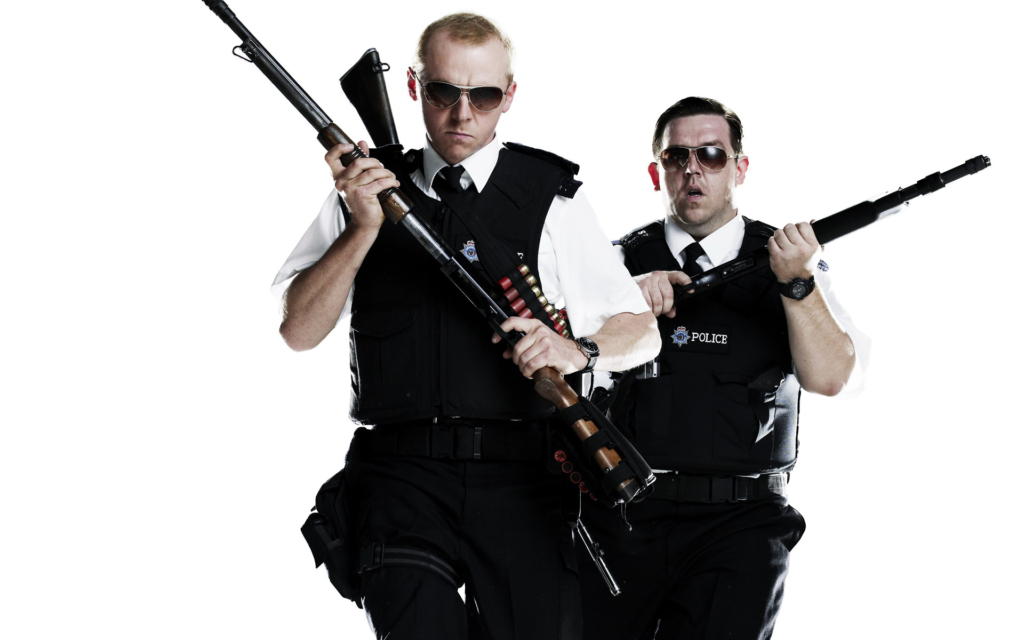The Harbingers of Hot Fuzz and Children of Men
State violence, smalltown prejudice – How two very different films, Hot Fuzz and Children of Men, predicted Britain’s growing intolerance and the COVID-19 pandemic nearly 20 years ago
“Whatever the cost, we would make Sandford great again.” So says Frank Butterman, the murderous inspector in Edgar Wright’s 2007 comedy Hot Fuzz, which predicted Brexit and the rise of nationalism nearly ten years before the referendum result to ‘take back control’ and Donald Trump’s 2016 election slogan.

On the film’s release, reviews focused on its British peculiarities, laughs and action. The seething outrage towards outsiders it depicts receives little comment. Settling to watch it as a comforting comedy today, viewers may be surprised by how far its characters’ farcical or fringe opinions, as viewed by audiences nearly twenty years ago, have now entered mainstream politics.
Lines spoken by Butterman – “Some travellers moved into Callhoun Park. Before you could say ‘gypsy scum’ we were knee deep in dog muck” – could be hard to tell apart from the Labour-Conservative-Reform MP Lee Anderson’s political discourse. In 2021 Anderson stated during a committee meeting to scrutinise the Police, Crime, Sentencing and Courts Bill that travellers are “likely to be seen leaving your garden shed at three o’clock in the morning, probably with your lawnmower and half of your tools. This happens every single time they come to Ashfield.”

The cheery Butterman, along with the cultlike village worthies making up the Neighbourhood Watch Alliance (NWA), sets upon forcibly removing anyone who compromises the village’s “rustic aesthetic,” all in the name of “the greater good.” This brings to mind the Brexit Campaign’s nostalgic allusions to a cosy old Blighty in monochrome, appeals famously responded to by the woman on Question Time demanding: “I want my country back, I want Britain to be Britain!” Other snippets of dialogue could easily be reimagined spilling from an outraged caller on LBC railing against “our hoody infestation.”
Boris Johnson might also have been paying attention. In 2019 he described the climate protest group Insulate Britian as “uncooperative crusties,” a line which almost sounds directly lifted” from Butterman scoffing about “thieving kids and crusty jugglers.” The NWA’s chummy bigotry is uncannily similar to that which Johnson and Brexit’s frontmen deployed, and the deluded villagers display the blind faith which the Leave Campaign required of its proponents.

Nicholas Pegg’s Sergeant Angel, parachuted in from “Lon-don”, shows a cold and unblinking professionalism deeply unconvincing to locals (“He isn’t even from round here!”). This also has its contemporary parallels in Keir Starmer, who 5,000 surveyed voters view as ‘competent’ but ‘smarmy’ and ‘unknown’, and who shares Angel’s authoritarian streak.
An altogether less palatable vision of the UK sliding into intolerance, released the year before Hot Fuzz, is Alfonso Cuaron’s Children of Men. The film depicts an authoritarian Britain in 2027 which is aggressively hostile towards all immigrants, or ‘fugees’. In the opening scene a news report announces that Britain’s borders have been closed for the last eight years and that illegal immigrants are deported.

This takes place within a world where all women are infertile and the planet’s youngest person is 18. The cause of this is never explicitly given but may be related to a 2008 flu epidemic. Many films predict world altering pandemics and fascist dystopias, but to see both set within run down London streets bustling with migrant driven tuk-tuks weaving between buses like Deliveroo riders – looking remarkably like a cash strapped Britain in 2024 – is an unsettling experience.
A line spoken by Jasper, Michael Caine’s hippy activist, about refugees sounds like a summary of the plight of many Eritreans and Afghanis today: “After escaping the worst atrocities and finally making it to England, our government hunts them down like cockroaches.” Britain may keep asylum seekers locked up out of sight rather than caged on the streets as in the film, but the Rwanda scheme shows an administration eager to implement performative cruelty into government policy.
Voicing concerns about Britain drifting towards authoritarianism could sound like alarmism, but the shift occurs by increments. The contrasting styles of Hot Fuzz and Children of Men suggest different ways these changes “for the greater good” could occur, whether by gradually removing citizens’ rights, or scorn for pluralism becoming the norm. There are many troubling signs from both Labour and the Conservatives that the right of public protest will not be protected, and that blatant dishonesty, the hostile environment for global victims and intolerance of dissenting voices will remain features of British politics, no matter who forms the next government.
GO HERE to support us: Backing Bella Caledonia

